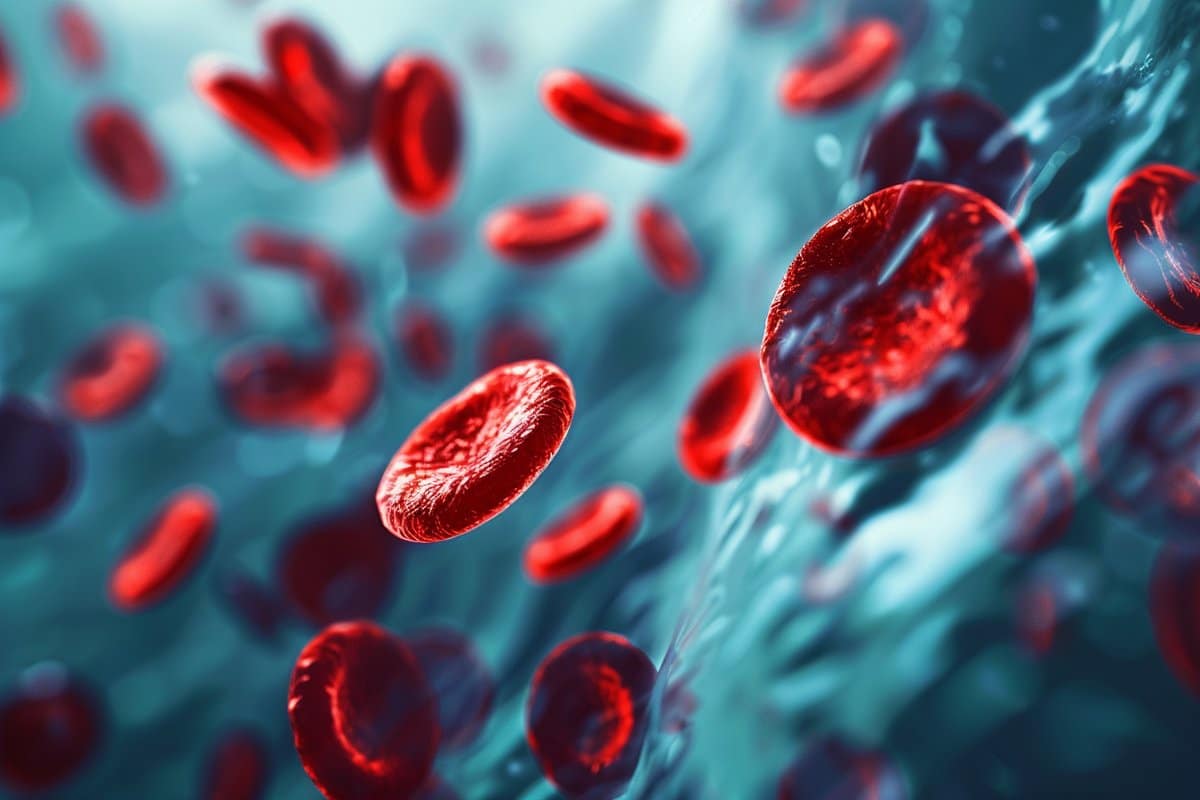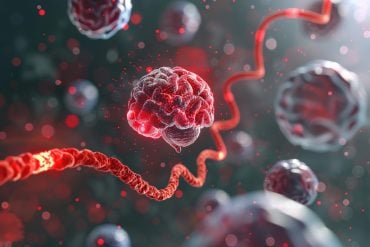Summary: Researchers made significant progress in understanding long COVID by identifying distinct inflammation patterns in the blood of individuals who have experienced severe SARS-CoV-2 infections. This large UK study, which analyzed over 650 patients, found that long COVID sufferers exhibit immune system activation long after initial hospitalization, with specific patterns correlating to different symptom types.
The discovery paves the way for targeting these immune responses with existing drugs, potentially offering new treatments for the millions affected worldwide. The study’s findings, highlighting the complexity of long COVID and the need for personalized treatment approaches, represent a major step forward in the ongoing battle against COVID-19’s long-term impacts.
Key Facts:
- Long COVID leads to ongoing inflammation detectable in the blood, with patterns varying by symptom type, pointing towards personalized treatment needs.
- Existing immune-modulating drugs, like IL-1 antagonists and JAK inhibitors, could offer potential treatment options for long COVID, suggesting a hopeful path for clinical trials.
- The study emphasizes the importance of understanding long COVID’s immune mechanisms but notes its findings are based on patients with severe initial infections, hinting at the complexity of the condition across different severities.
Source: Imperial College London
People with long COVID have distinct patterns of inflammation detectable in the blood, which could potentially be targeted with immune therapies.
Findings from the largest UK study of patients hospitalised with SARS-CoV-2 infection show that long COVID leads to ongoing inflammation which can be detected in the blood.

In an analysis of more than 650 people who had been hospitalised with severe COVID-19, patients with prolonged symptoms showed evidence of immune system activation. The exact pattern of this activation varied depending on the sort of symptoms that they predominantly had – for example, mainly fatigue or cognitive impairment.
The research, led by Imperial College London, suggests that existing drugs which modulate the body’s immune system could be helpful in treating long COVID and should be investigated in future clinical trials.
The study, published in the journal Nature Immunology, is the latest research from two collaborative UK-wide consortia, PHOSP-COVID and ISARIC-4C. These involve scientists and clinicians from Imperial alongside collaborators from the Universities of Leicester, Edinburgh and Liverpool among others and funded by UK Research and Innovation (UKRI) and the National Institute for Health and Care Research (NIHR).
Professor Peter Openshaw, from Imperial’s National Heart & Lung Institute and an ISARIC-4C lead investigator, said: “With one in ten SARS-CoV-2 infections leading to long COVID and an estimated 65 million people around the world suffering from ongoing symptoms, we urgently need more research to understand this condition. At the moment, it’s very hard to diagnose and treat.
“This study, which includes detailed clinical data on symptoms and a raft of inflammatory blood plasma markers, is an important step forward and provides crucial insights into what causes long COVID.”
Runaway inflammation
In the latest study, researchers included a total of 426 people who were experiencing symptoms consistent with long COVID – having been admitted to hospital with COVID-19 infection at least six months prior to the study.
They were compared with 233 people who were also hospitalised for COVID-19 but who had fully recovered. The researchers took samples of blood plasma and measured a total of 368 proteins known to be involved in inflammation and immune system modulation.
They found that, relative to patients who had fully recovered, those with long COVID showed a pattern of immune system activation indicating inflammation of myeloid cells and activation of a family of immune system proteins called the complement system.
Myeloid cells are formed in the bone marrow and produce various types of white blood cells that circulate in the blood and migrate into organs and tissues where they respond to damage and infection.
The complement system consists of a cascade of linked proteins that are activated in response to infection or tissue damage. Notably, overactivation of the complement system is known to be associated with many autoimmune and inflammatory conditions.
Dr Felicity Liew, from Imperial’s National Heart & Lung Institute, said: “Our findings indicate that complement activation and myeloid inflammation could be a common feature of long COVID after hospitalisation, regardless of symptom type.
“It is unusual to find evidence of ongoing complement activation several months after acute infection has resolved, suggesting that long COVID symptoms are a result of active inflammation. However, we can’t be sure that this is applicable to all types of long COVID, especially if symptoms occur after non-hospitalised infection.”
Subtypes of long COVID
The researchers were also able to obtain comprehensive information about the range of symptoms that patients were experiencing, and which ones were most common.
They found that certain groups of symptoms appeared to be associated with specific proteins. For example, people with gastrointestinal symptoms had increased levels of a marker called SCG3, which has previously been linked to impaired communication between the gut and the brain.
Overall, there were five overlapping subtypes of long COVID with different immune signatures, despite some commonalities, namely: fatigue; cognitive impairment; anxiety and depression; cardiorespiratory; and gastrointestinal.
The researchers stress, however, that these groups are not mutually exclusive, and people can fall between groups depending on their symptoms.
Nevertheless, these long COVID subtypes seem to represent clear biological mechanisms of disease and highlight that different symptoms may have different underlying causes. The researchers suggest this could be useful in designing clinical trials, especially for treatments that target immune responses and inflammation.
One such treatment could include drugs called IL-1 antagonists, such as anakinra, which is commonly used to treat rheumatoid arthritis, as well as another drug class called JAK inhibitors, used to treat some types of cancers and severe forms of rheumatoid arthritis. Both drug types work by targeting components of the immune system that might be activated in long COVID.
The researchers highlight that one limitation of their study was that it only included people who had severe SARS-CoV-2 infections and who were hospitalised as a result. Yet a sizeable proportion of people who develop long COVID in the wider population only report mild initial SARS-CoV-2 infection and it’s unclear if the same immune mechanisms are at work.
Professor Openshaw concludes: “This work provides strong evidence that long COVID is caused by post-viral inflammation but shows layers of complexity. We hope that our work opens the way to the development of specific tests and treatments for the various types of long COVID and believe that a ‘one size fits all’ approach to treatment may not work.
“COVID-19 will continue to have far reaching effects long after the initial infection has passed, impacting many lives. Understanding what’s happening in the body, and how the immune system responds, is key to helping those affected.”
The PHOSP-COVD and ISARIC4C are both funded by UK Research and Innovation (UKRI) and the National Institute for Health and Care Research (NIHR) and both include partner institutions from all four nations of the UK.
About this long-COVID research news
Author: Ryan O’Hare
Source: Imperial College London
Contact: Ryan O’Hare – Imperial College London
Image: The image is credited to Neuroscience News
Original Research: Open access.
“Large scale phenotyping of long COVID inflammation reveals mechanistic subtypes of disease after COVID-19 hospitalisation” by Peter Openshaw et al. Nature Immunology
Abstract
Large scale phenotyping of long COVID inflammation reveals mechanistic subtypes of disease after COVID-19 hospitalisation
One in ten severe acute respiratory syndrome coronavirus 2 infections result in prolonged symptoms termed long coronavirus disease (COVID), yet disease phenotypes and mechanisms are poorly understood.
Here we profiled 368 plasma proteins in 657 participants ≥3 months following hospitalization. Of these, 426 had at least one long COVID symptom and 233 had fully recovered.
Elevated markers of myeloid inflammation and complement activation were associated with long COVID. IL-1R2, MATN2 and COLEC12 were associated with cardiorespiratory symptoms, fatigue and anxiety/depression; MATN2, CSF3 and C1QA were elevated in gastrointestinal symptoms and C1QA was elevated in cognitive impairment.
Additional markers of alterations in nerve tissue repair (SPON-1 and NFASC) were elevated in those with cognitive impairment and SCG3, suggestive of brain–gut axis disturbance, was elevated in gastrointestinal symptoms.
Severe acute respiratory syndrome coronavirus 2-specific immunoglobulin G (IgG) was persistently elevated in some individuals with long COVID, but virus was not detected in sputum.
Analysis of inflammatory markers in nasal fluids showed no association with symptoms. Our study aimed to understand inflammatory processes that underlie long COVID and was not designed for biomarker discovery.
Our findings suggest that specific inflammatory pathways related to tissue damage are implicated in subtypes of long COVID, which might be targeted in future therapeutic trials.






